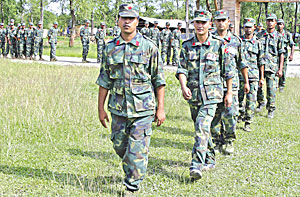 UNMIN |
The country cannot afford to have thousands of war-hardened young men and women disillusioned, angry and insecure. They will not live in the cantonments forever.
The Nepal Army knows it will have to take in some of the Maoist fighters. The Maoists know that not all their soldiers can get into the army. They will have to agree on numbers, but only after public posturing and secret bargaining.
There will be a tussle within the NC and the army pushing the principle of individual entry, and the Maoists asking for recognition in principle of bulk entry. How it will play out depends a lot on what happens in the Maoist meeting next month and whether Puhspa Kamal Dahal or Mohan Baidya emerges the stronger. It will also depend on what COAS Gen Katuwal's associates inside and outside the army tell him. He doesn't have the strength to go to the brink by himself.
Dahal needs to find a deal he can sell to his commanders, who can then go and sell it to the guerrillas in the camps. Any such deal will also have to allay the apprehensions of non-Maoist forces that one party will control the entire defence establishment.
The reason to be hopeful is that both armies have a history of talking to each other from the war days. The JMCC, which includes UNMIN and top military brass of both sides, has been a rare institutional success. India has enormous leverage with both sides and will not allow the process to fall apart over a row on integration. The Indians have said the army should not be disturbed but that stance will have to evolve as we approach the endgame. The Indian Army may talk to the Nepali brass, and MEA with RAW will push the Maoists.
But the real battle here is not over numbers, but control. The army has never been as autonomous in its functioning as it is now. It would like to retain this independence because of its deep distrust for the political parties, its antagonism towards the Maoists, and its contempt for the civilian bureaucracy.
The army top brass has been unaccountable for all its actions and finances. This is the only country where UN peacekeeping money goes to the army, not the state treasury. Recently, the army transferred officers without even telling the Ministry of Defence. It often purchases equipment on a single tender, generating huge opportunities for kickbacks.
For their part, the Maoists know that their political consolidation will remain incomplete as long as the army is out of hand. They did not fight the war to get a few thousand of their soldiers into the army at junior levels. Their aim is to have both political and ideological control over the military and a decisive say in the command structure. And since the elections, they can claim democratic legitimacy to push this agenda.
But political control does not mean the Maoists or a Maoist minister will control the army. It means the Ministry of Defence running the army affairs and not being a mere postbox. It means strong all-party parliamentary defence committees keeping an eye on army finances and its professionalism. It means regular oversight by the whole cabinet.
For too long, the army has been in the hands of a tiny nexus of generals from the hill elite. Integration needs to take place for the peace process to succeed. The army has to be brought under civilian control if we want politics in the country to stabilise, without allowing any party to think of the institution as its own fiefdom.
And the army needs to be more inclusive of the marginalised to give diverse communities a sense of ownership and help carve a new sense of nationalism.



